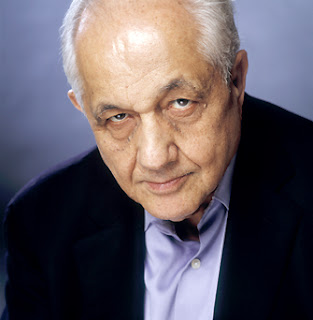A los maestros con cariño.../IX

El casi octogenario Andrew Sarris -alguna vez crítico de cabecera del Village Voice, hoy escribiendo semanalmente en The New York Observer- es uno de los auténticos dinosaurios de la crítica fílmica mundial. Si exceptuamos al nonagenario Stanley Kauffman -a quien le dedicamos la entrada anterior de esta serie- no hay un cinecrítico en activo con la historia intelectual de Sarris: colaborador cercano del legendario Henri Langlois en la Cinemateca Francesa; co-autor de la teoría del cine de autor junto con los críticos -y luego cineastas- Francois Truffaut, Jean-Luc Godard et al; y brillante polemista que tuvo una rivalidad de toda la vida con la influyente cinecrítica del New York Times Pauline Kael, con la que intercambió razones e insultos. (Ah, otra cosa: acuñó el término "Antoniennui" para señalar la aburrición que le provocaba buena parte del cine de Antonioni: fue ahí cuando se convirtió en uno de mis héroes, hace casi dos décadas, cuando empecé a escribir profesionalmente de cine). Con el paso del tiempo, Sarris se ha vuelto más moderado, más amable y menos creyente en su infabilidad. Buena lección si queremos llegar, como él, a los 80 años de edad y escribiendo sobre cine. A continuación, una muestra de su trabajo. Como siempre, su juicio se mezcla con confesiones personales, opiniones que van más allá del cine y una petición al cinéfilo/lector: que use su propio criterio. Después de todo, los críticos nos equivocamos:
Theo Angelopoulos’ The Weeping Meadow, from a screenplay by Mr. Angelopoulos, Tonino Guerra, Petros Markaris and Giorgio Silvagni, is presented as the first film of a projected trilogy set against the background of 20th-century Greek history, beginning here with the flight of Greek refugees from Odessa to Thessaloniki after the final victory of the Bolsheviks in Russia. I know a little bit about this period in Greek history, because my father fought in the first Balkan War and told me many stories about his experience. Or was it his brother who fought in the Balkan War? I forget. Actually, there may have been two Balkan Wars; Greek history from 1821 onward is all about regional wars and internal discords.The Weeping Meadow follows its characters at a great distance in a series of lengthy lateral camera movements that track them through Fascist dictatorships, the war against the Italians in Albania, World War II, the German occupation, the British liberation and the civil war that followed, all the way to 1952. It is clear from scattered comments here and there that Mr. Angelopoulos is an artist of the left, as are most filmmakers around the world who get their major recognition from international film festivals and all the cinematic intelligentsia who assemble there. In these circles, at least, Mr. Angelopoulos is regarded as Greece’s greatest filmmaker.
In this context, I hate to strike a sour note in the symphony of praise that has resounded around the world over his efforts. But I must confess that I haven’t liked an Angelopoulos film since his second feature, Days of 36 (1972), a farcically satirical jab at the Metaxas dictatorship, which ruled Greece through the 30’s and early 40’s, until the Germans overran the country—fatally delaying their invasion of Russia, my father always insisted. As it happens, I was brought up by parents who were Monarchists in Greece and rock-ribbed Republicans in America. Indeed, my stand-up comedy line at political gatherings is that we were the only relief family in Brooklyn to vote for Alf Landon in 1936.
But my differences with Mr. Angelopoulos are not political but aesthetic. According to Angelopoulos admirer David Thomson in his invaluable The New Biographical Dictionary of Film, the Greek director declared that his strongest influences were Murnau, Mizoguchi and Welles. Certainly, his exclusive reliance on camera movement seems to place him in the anti-montage category so favored by the late André Bazin; still, I much prefer the camera movements of Max Ophüls and Kenji Mizoguchi over those of Angelopoulos and Stanley Kubrick. With Ophüls and Mizoguchi, the camera follows the characters, whereas with Angelopoulos and Kubrick, the characters follow the camera.
His triumphs, if any, lie in the realms of pictorialism (landscapes and seascapes) and epical ambition, but not in dramatic narrative or emotional projection. In The Weeping Meadow, he stays so far away from his characters that there’s hardly any trace of physical sensuality. Also, his films are so relentlessly slow that he makes the much-criticized Antonioni and Dreyer seem like speed demons by comparison. And to think that I once coined the expression “Antoniennui” in what I now regard as an ill-considered jest.
But don’t take my word for it; if you’re at all serious about cinema, you must see The Weeping Meadow for yourself. Who knows? I’ve been wrong before. It’s not that I doubt Mr. Angelopoulos’ sincerity and conviction. His life has been poured into his art—but I simply haven’t been moved by the effort.
Publicado en The New York Observer el 6 de octubre de 2005.


Comentarios